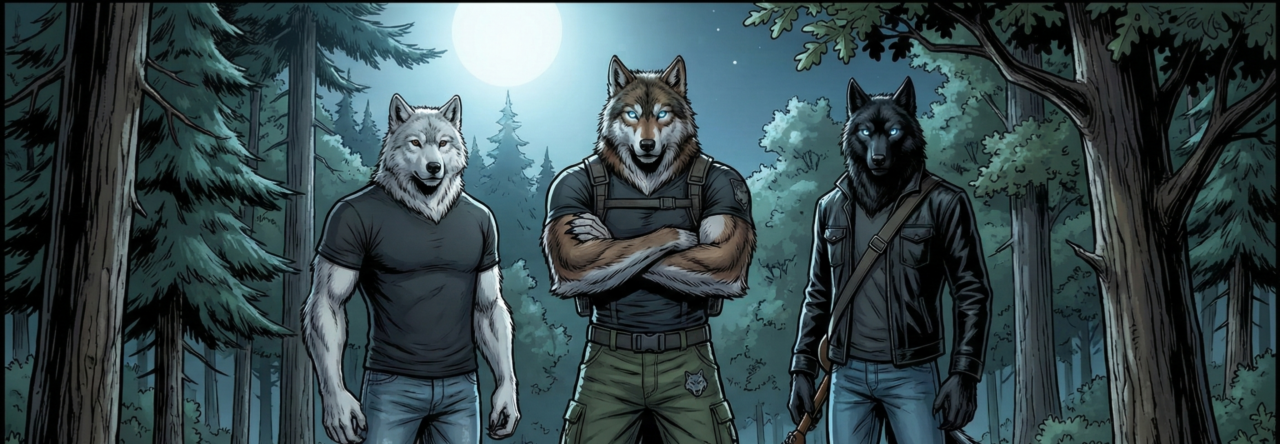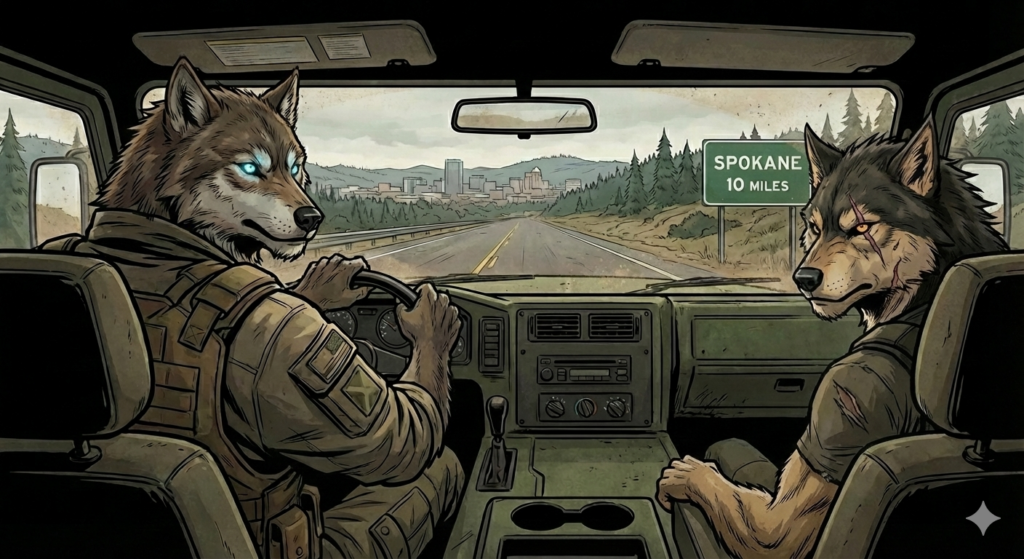The last frost still clung to the shadows, but morning light spilled through the cabin windows like it finally meant it. Snowmelt whispered outside. The world smelled like wet earth, pine, and the start of something softer.
Inside, chaos reigned as usual. Holt thundered around the kitchen like a one-wolf stampede, bowls clanging and spoons flying. Gabriel sat at the table, wrapped in a blanket, trying to tune his guitar between yawns. Mark hunched over a small pile of wire and a screwdriver, muttering quietly about resistors. Kade and Rime checked their gear by the door, silent rhythm born of habit. Varro sat in the corner chair, legs crossed, reading the patrol log like it was scripture.
It was loud, warm, alive—the usual.
Then Thane’s door opened.
No sound followed, not even the soft creak of floorboards under his paws. He stepped into the room, fur brushed, eyes clear, a calm gravity in motion. Conversations tapered off like wind meeting still water. Holt froze mid-ladle; Gabriel’s hand stopped over a string. The room simply knew.
Thane stood at the center, looking at each of them—not inspecting, not commanding. Just seeing.
“I want you all to know something,” he said quietly.
Every ear turned toward him.
“All of you. I love you with all my heart, and I’m thankful you’re in my pack.”
For a heartbeat, no one even breathed. Then he turned, pushed open the door, and stepped out into the morning light. The latch clicked behind him, simple and final.
Silence lingered—the kind that fills a chest rather than empties it.
Holt blinked first. “Holt heart… hurt good way,” he said, clutching his chest dramatically.
Gabriel swallowed hard and laughed once through his nose. “That… that actually happened, right?”
Kade nodded slowly, voice soft. “Yeah. He said it.”
Varro looked down at the patrol log, blinking fast. “He meant it,” he whispered.
Rime’s tail flicked once. “He never say things he not mean.”
Mark exhaled, smiling faintly. “Well. Guess the day’s officially perfect already.”
They sat for another long minute, letting the words settle like warm stones in cold water. Then, without needing to discuss it, everyone started moving again—but quieter. Gentler.
Kade reached for his jacket. “Come on. Market day waits for no wolf.”
Libby’s heart beat loud that morning. The snowmelt ran in the gutters; the streets were half mud, half promise. Stalls lined the square—tables of bread, salvaged tools, old pre-Fall trinkets. Children darted between legs with handfuls of early flowers, trading smiles for scraps of candy.
Marta stood at the center, clipboard in hand, directing traffic like a benevolent storm. Hank leaned against the gatepost, rifle slung but easy, the picture of peace with watchful eyes.
When Thane reached the square, heads turned, not out of fear but affection. He walked with that same easy stillness—talked with a vendor about wiring, helped an old man lift a crate, ruffled the hair of a laughing boy who called him “Big Wolf.”
“Morning, Alpha,” Marta greeted. “First spring market—looks like the whole town woke up at once.”
“About time,” Thane said. “Been a long winter.”
“Too long,” she agreed. “You bring your crew?”
“They’ll be along,” he said, smiling faintly. “Eventually.”
Sure enough, a few minutes later, they arrived one by one.
Holt came first, carrying a woven basket that smelled suspiciously like yeast and chaos. “Holt Bread!” he bellowed, slamming the basket on an empty table. “Soft bread! Real soft! Maybe!”
The nearby vendors laughed, immediately flocking to see what the noise was about. Holt pulled out steaming loaves, slightly lopsided but golden. “Holt make with sugar! Not weapon bread this time!”
A young woman took a cautious bite, then grinned. “It’s actually good!”
Holt puffed out his chest. “Holt told you. Holt master baker now.”
“Baker or menace?” Kade teased as he passed by.
Holt considered. “Both. Better story that way.”
Rime set up beside him, organizing the loaves into neat rows while Holt tried to “decorate” with far too much enthusiasm. Rime’s patience was endless; he moved silently, adjusting everything after Holt’s every attempt.
“Teamwork,” Holt said proudly.
“Correction,” Rime replied.
Gabriel found a dry bench at the edge of the square, tuning his guitar. His music drifted light and warm, mixing with the chatter and the clink of market trade. Children clustered near his paws, wide-eyed. He started playing something gentle—old-world rhythm turned playful. One little girl clapped along, off-beat but happy.
“You taking requests?” Hank called.
“Only if you’re paying in pie,” Gabriel said.
“Deal,” Hank said. “You play, I’ll get Marta baking.”
Kade spent the morning helping secure stalls, his natural caution making him everyone’s favorite problem-solver. A few local teens—sons of the hunters—followed him, curious about patrol life.
He pointed at the mud near the well. “You see that split print? Fox came through here last night. Light step, see? Toe marks clean.”
The boys nodded, fascinated. Kade smiled faintly. “That’s how you learn to see trouble before it sees you.”
One of the teens asked, “What about raiders?”
Kade’s tone stayed calm. “We see them too. But now, they see us first. And that’s usually enough.”
The boys grinned, proud to learn from a wolf who spoke like a teacher, not a monster.
Varro spent the morning talking with a pair of traders who’d arrived from Whitefish. His clear speech and quiet authority surprised them; most humans still expected ferals to snarl more than they spoke. He helped them mark safe trails on a map, warning of landslides and soft ground from melting snow.
One of the men hesitated before asking, “You’re with… the Alpha?”
Varro nodded. “He saved me. Changed me. Libby’s safe because of him.”
The trader offered his hand, tentative but sincere. “Then I’m glad he did.”
Varro shook it, claws careful. “So am I.”
At one point, a child offered Holt a flower crown. Holt blinked at it, sniffed, and placed it proudly on his head. “Holt beautiful now,” he declared.
“You were something before,” Gabriel called from the bench.
“Holt still something!” Holt shot back, grinning. “Now smell better!”
Laughter rolled through the square. Marta actually had to cover her mouth. Even Thane chuckled from where he stood helping unload firewood.
As noon climbed high, the square grew louder—voices, laughter, the clatter of trade. For the first time in years, the sound of joy drowned out the memory of gunfire.
Marta stopped beside Thane, handing him a mug of tea. “Feels different, doesn’t it?”
“Yeah,” he said quietly. “Like the world remembered how to live.”
“I’m thinking about starting a school,” she said. “Kids are ready. They deserve normal.”
Thane looked toward the laughing children chasing Holt, who was pretending to run away in “fear.” “Then the world’s healing,” he said. “Make sure they learn the right stories.”
“Already planned,” Marta said. “You’ll have to visit. Maybe a ‘how to fix things without killing anyone’ lecture.”
He smiled. “I might know a few examples.”
By dusk, the last stalls packed up under a sky streaked pink and gray. The pack trickled back to the cabin one by one, tired and content. The smell of stew and bread filled the room again.
Gabriel plucked at his guitar softly. “You know,” he said, “what he said this morning… hit harder than any storm we’ve been through.”
Varro nodded slowly. “First time I ever heard an Alpha say ‘love.’ I didn’t think that word was allowed.”
Kade leaned back in his chair. “He doesn’t say things twice. That means we remember it forever.”
Holt lifted a spoonful of stew. “Alpha say love. Holt say hungry. Both true.”
Rime’s tail flicked once, approving. “Both important.”
Mark smiled from his seat near the fire. “You realize what we did today? A whole market day. No fights, no fear. Just life.”
Gabriel looked around the table—at claws, scars, laughter, home. “Guess that’s what we fought for.”
The door opened then. Thane stepped in, fur dusted with evening light, eyes tired but calm. Mud on his paws, faint smile on his muzzle. He didn’t say a word—he didn’t have to.
They made room for him at the table, and Holt slid a bowl across with a grin. “Alpha get first scoop. Holt made with heart.”
Thane chuckled quietly. “Let’s hope you didn’t bake the heart in.”
The laughter that followed was easy, full, whole.
Outside, the spring wind whispered through the trees. Inside, the pack ate together under the glow of firelight and contentment. The long winter was finally over, and for the first time in years, Libby sounded like home.

